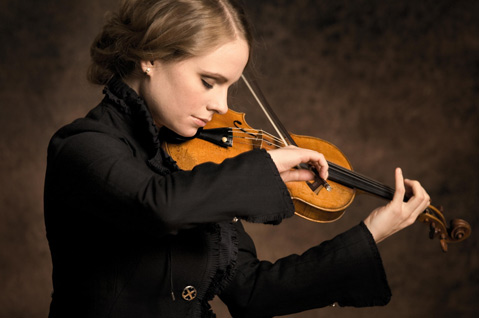Julia Fischer, Violin
Top Violinist Fischer Brings Challenging Program to UCSB

In the high-flying fast lane of international concert violin performance, German musician Julia Fischer is the hottest thing under 30. Her ascent has been marked by wise choices of repertoire and of concert opportunities, irreproachable technique, and a ferocious ambition to be the very best. What’s new for Fischer as she heads for UCSB’s Campbell Hall on February 23 as part of the 2012 Arts and Lectures classical series is a certain spark of excitement that’s coming from, of all places for a musician so firmly identified with Germany and Austria, the musical tradition of France. Reviews are just in from her first appearance on this tour in St. Paul, and the news is that her rendition of Claude Debussy’s Sonata in G Minor, performed with her long-time collaborator Milana Chernyavska on piano, is “something else” as Rob Hubbard, classical music critic of the Twin Cities Pioneer Press put it on February 15, 2012.
The program that Fischer will play in Santa Barbara not only includes the Debussy G minor sonata, which is among the most daring and passionate works ever written for violin, but will also feature the Sonata for Violin and Piano No. 1 in D minor, op. 75 of French composer Camille Saint-Saëns, a notoriously difficult work that exemplifies Saint-Saëns’s decidedly French exaltation of Ludwig van Beethoven’s ideal of sonata form.
When I spoke with the forthright Fischer by phone from her hotel in St. Paul last week, she brooked no contradiction on the question of the challenge of Saint-Saëns’s Sonata No. 1. “It is the most difficult violin sonata,” she said, and the long pause that followed indicated that this was her opinion, full stop. It is certainly a lengthy and arduous piece, and the demands of the final movement, Allegro molto, are equally taxing on the pianist, so one is tempted to believe her, especially since she delivers such pronouncements with the succinct world-weariness of a child prodigy who has apparently never for a moment doubted the superiority of serious music to all other forms of human endeavor.
Which is not to say that Fischer, who graced the cover of this paper’s Winter Arts Preview issue last month, is not without her charms. On the second of her two discs recording the music for piano and violin of Franz Schubert, released in 2010 on Pentatone, Fischer joins her collaborator Martin Helmchen for the F Minor Fantasia, which she plays not on violin, but on piano. Needless to say, few contemporary violinists of Fischer’s rank are sufficiently confident of their piano playing to commit it to a commercial recording, and the results, although not in the same league with her efforts on the violin, are nevertheless remarkable. When I asked Fischer about the piano, she responded off-handedly, saying, “I don’t play piano onsite more than once or twice a year, but I did enjoy playing as a child, and it was my first instrument growing up.” Pressed on the usefulness of approaching Schubert’s music via the keyboard, Fischer owned that “it makes sense to study Schubert from the pianist’s point of view—that’s where he excels as a composer.”
During the next few weeks, Fischer will play a mere six concerts in the United States before returning to a demanding schedule of mostly European appearances. Asked about her favorites among contemporary violinists, Fischer understandably demurred, explaining that “when you play 70 nights a year, you don’t necessarily rush out to hear another violinist on your night off.” That said, Fischer contended that the single most gratifying experience she has had recently as a performer was an extended tour of approximately 10 concerts with the Academy of St. Martin in the Fields that she completed at the end of 2011. “It’s great touring with an orchestra,” she said, “especially compared to the usual soloist experience of showing up and just playing through a concerto once. When you tour with an orchestra, you get a chance to go out afterwards and get to know the other musicians and really hear what they think. I enjoy it very much.”
For the summer of 2012, Fischer has yet another change of direction in store, this time into the world of the string quartet. “It’s just some friends that I enjoy playing with” she said, not willing as yet to name the personnel, “but I can tell you that it will be good.”
4•1•1
Julia Fischer and Milana Chernyavska will be at UCSB’s Campbell Hall on Thursday, February 23, at 8pm. For tickets and information, call (805) 893-3535 or visit artsandlectures.sa.ucsb.edu.



